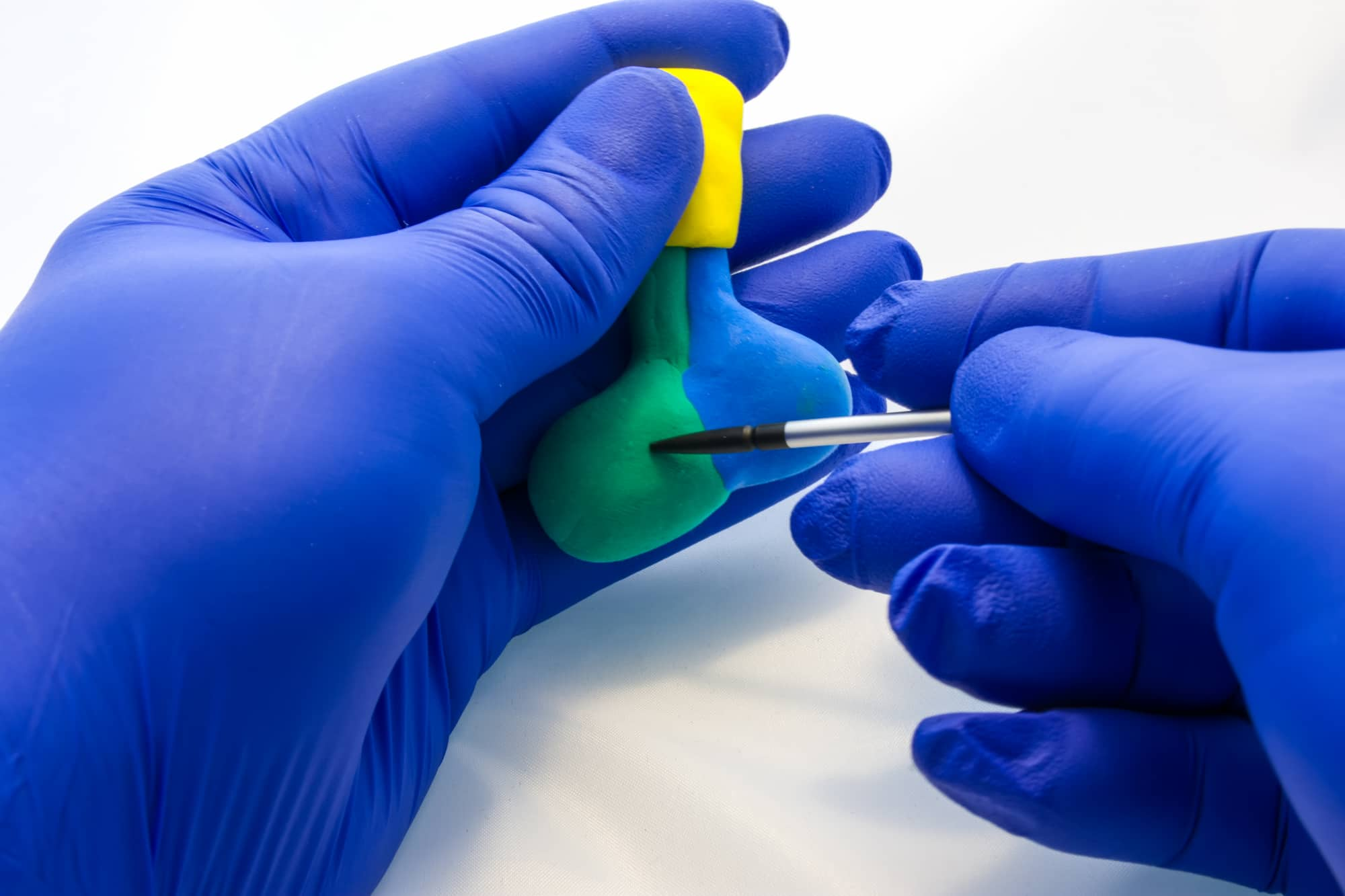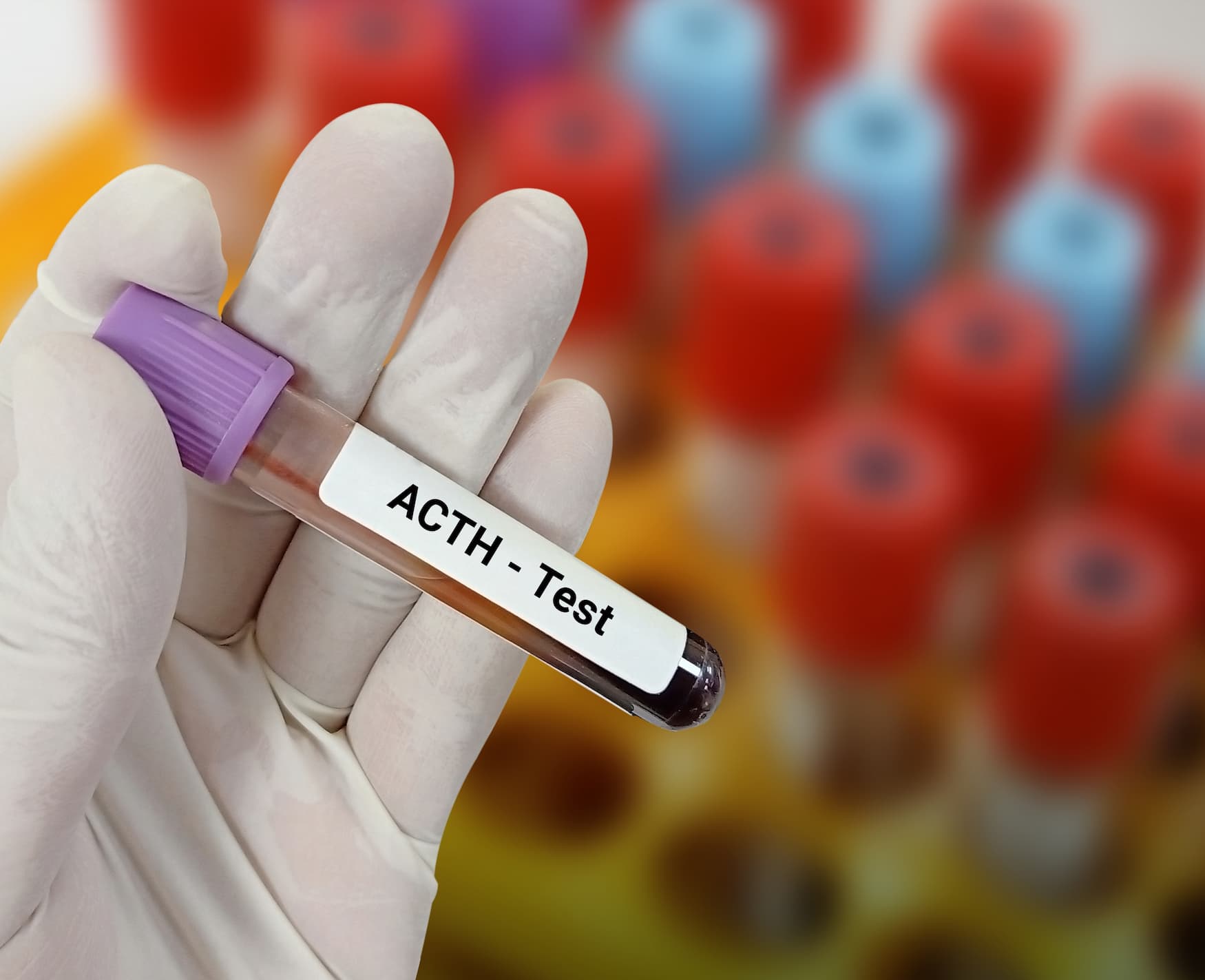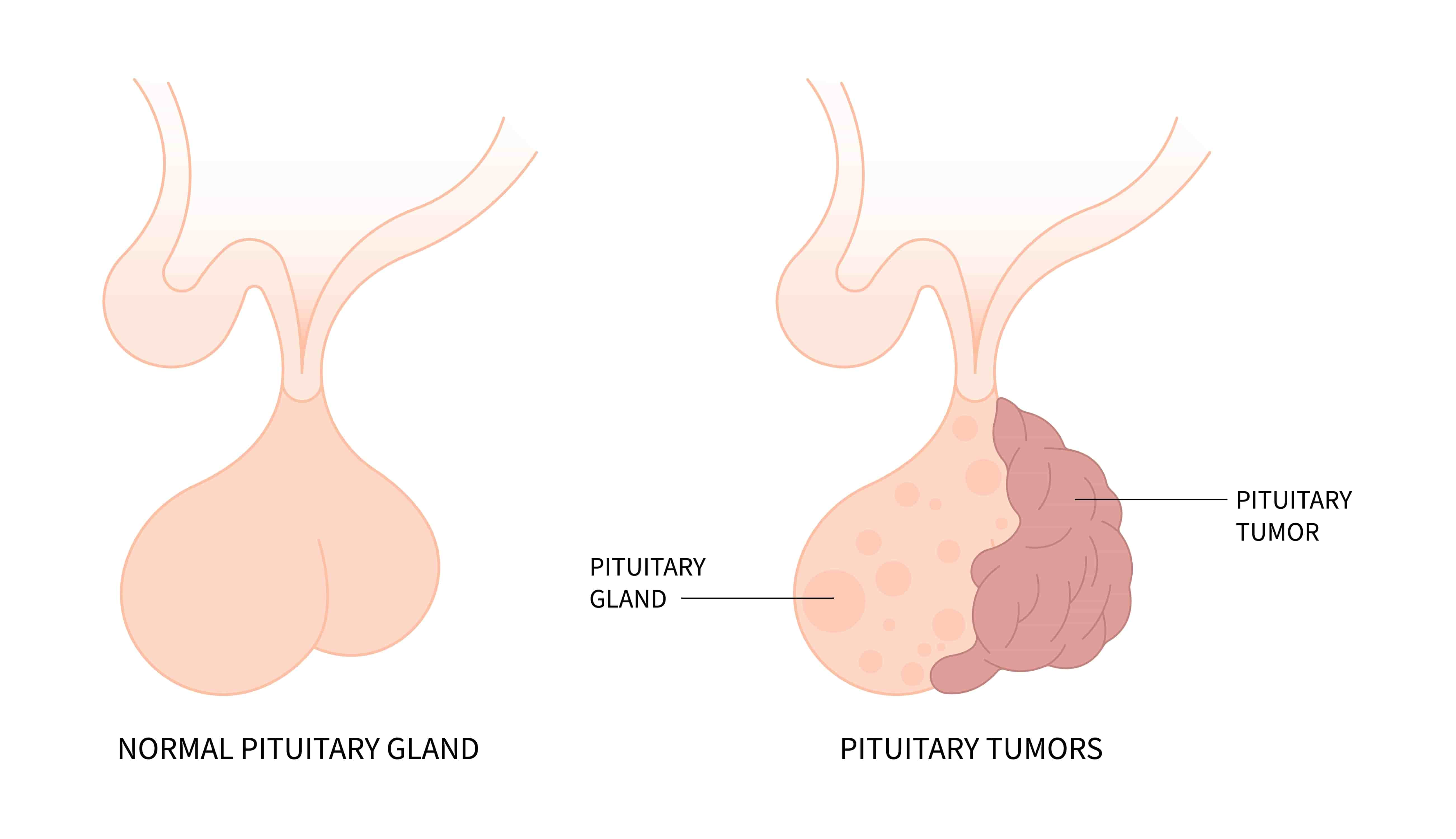Pituitary Tumor Treatment in Turkey
Healthy Türkiye helps you find the best pituitary tumor treatment in Turkey at affordable prices and adopts a 360-degree service approach in all areas of health through affiliated hospitals.
- Medical Treatment
- Endocrinology Treatment in Turkey
- Polycystic Ovary Syndrome Treatment in Turkey
- Hypertension Treatment in Turkey
- Hyperthyroidism Treatment in Turkey
- Thyroid Disease Treatment in Turkey
- Acromegaly Treatment in Turkey
- Gigantism Treatment in Turkey
- Hirsutism Treatment in Turkey
- Hypopituitarism Treatment in Turkey
- Pediatric Endocrinology Treatment in Turkey
- Hormonal Imbalance Treatment in Turkey
- Pituitary Tumor Treatment in Turkey
- Hypothyroidism Treatment in Turkey
- Pheochromocytoma Treatment in Turkey
- Homepage
- Medical Treatment
- Pituitary Tumor Treatment in Turkey

About Pituitary Tumor Treatment in Turkey
Pituitary tumor treatment in Turkey is carefully performed by trained and experienced neurosurgeons. A pituitary tumor is an abnormal growth that occurs in the pituitary gland. The pituitary is a tiny gland in the brain. It is located on the body behind the nose. It makes hormones that affect many other glands and many functions in your body. Many pituitary tumors are not cancerous. It means benign. They do not spread to other sites in your body. But they might cause the pituitary to make too few or too many hormones, causing issues in the body.
Pituitary tumors that produce too many hormones will cause other glands to create more hormones. This causes symptoms related to each of the specific hormones. Most pituitary tumors will also press against the nearby optic nerves. This can lead to the appearance of vision problems. Many pituitary tumors do not cause symptoms. As a consequence, they are not diagnosed. Or they are found only during a usual brain imaging test. About 25 percent of people might have tiny pituitary tumors without knowing it.
In Turkey, all patients with pituitary tumors are seen by a pituitary endocrinologist and a pituitary neurosurgeon, who are experts with advanced training and knowledge in dysfunctions of the pituitary gland. Our experts have vast experience in diagnosing and treating what can be a complex case, seeing up to 600 pituitary tumor patients every year. At Healthy Türkiye, we offer a multidisciplinary approach to care, with experts from fields such as radiation therapy, pathology, and neuro-ophthalmology available to consult whenever needed.

What Is Pituitary Tumor Treatment in Turkey?
Pituitary tumors are located in the pituitary gland, a pea-sized organ in the center of the brain, just above the nose. Pituitary tumor treatment in Turkey performs treatment methods using the latest technology. The pituitary gland is sometimes called the “master endocrine gland” because it produces hormones that affect the way many parts of the body work. It also administers hormones made by many other glands in the body. Pituitary tumors are divided into three main groups.
Benign pituitary adenomas: These tumors that are not cancer. These tumors grow very slowly and do not spread from the pituitary gland to other sites of the body.
Invasive pituitary adenomas: Benign tumors that might spread to bones of the skull or the sinus cavity below the pituitary gland.
Pituitary carcinomas: These tumors are malignant (cancer). These pituitary tumors spread into other areas of the central nervous system (brain and spinal cord) or outside of the central nervous system. This is not a very common tumor.
Pituitary tumors might be either non-functioning or functioning. Non-functioning pituitary tumors can not make extra amounts of hormones. Functioning pituitary tumors produce more than the normal amount of one or more hormones. Most pituitary tumors are running tumors. The extra hormones produced by pituitary tumors might cause certain signs or symptoms of the disease.
Diagnosis for Pituitary Tumor Treatment in Turkey
Many surgeons in Turkey say that early diagnosis of pituitary tumors is important for treatment. Pituitary tumors generally are not noticed or detected. In many conditions, that is because the symptoms caused by pituitary tumors that make hormones, called functioning adenomas, and large tumors, called macroadenomas, are similar to those of other medical cases. This is also because they grow very slowly over time. Small pituitary tumors that do not make hormones, called non-functioning microadenomas, generally do not cause symptoms. If they are detected, it is normally because of an imaging exam, such as an MRI or a CT scan, that is done for another reason.
To detect and diagnose a pituitary tumor, your healthcare provider in Turkey will likely talk with you about your personal and family medical history and do a physical exam. Testing to detect a pituitary tumor also might involve:
Blood tests can analyze whether your body has too much or too little of certain hormones. For some hormones, blood test consequences that show too much of the hormone might be all that is needed for your specialist to diagnose a pituitary adenoma.
A urine test might be applied to help diagnose a pituitary adenoma that is making too much of the hormone ACTH. Too much ACTH may lead to too much cortisol in the body and causes Cushing disease.
A magnetic resonance imaging scan also called an MRI scan, is a test that applies a magnetic field and computer-generated radio waves to create detailed images of the body’s organs and tissues. An MRI of the brain can help detect a pituitary tumor and show it is location and size.
A computed tomography scan also known as a CT scan is a type of imaging test that combines a series of X-rays to create cross-sectional pictures. MRI scans are used more frequently than CT scans to detect and diagnose pituitary tumors. But a CT scan might be helpful in planning surgery if your specialist tells you that a pituitary tumor must be removed.
A pituitary tumor can affect eyesight, especially side vision, also known as peripheral vision. Testing your eyes to check how well you can see might help your healthcare provider decide if other tests might be needed to detect a pituitary tumor.
Your specialist at Healthy Türkiye might refer you to a specialist in hormone disorders, called an endocrinologist, for more testing.

We Care About Your Health
Healthy Türkiye provides the best for your health and comfort. You will feel privileged with us.
7/24 Quality Personal Assistance Throughout Your Journey
Customizable for You All-Inclusive Packages
Get the Right Advice for your Health
How Is Pituitary Tumor Treatment Performed in Turkey?
For a pituitary tumor, different types of doctors generally work together to create a patient’s overall treatment plan that combines different types of treatments. This is known as a multidisciplinary team. Healthcare teams at Healthy Türkiye might include a variety of other healthcare professionals, such as physician assistants, nurse practitioners, oncology nurses, social workers, pharmacists, counselors, dietitians, and others.
Any person with a pituitary tumor should be seen by an endocrinologist, which is a doctor who specializes in issues with glands, hormones, and the endocrine system. In addition, patients must be examined by a neurosurgeon, a specialist who operates on the head, brain, and central nervous system. Patients with vision issues will also need to visit an ophthalmologist, a doctor who specializes in the treatment and diagnosis of eye issues.
The common types of treatments used for pituitary gland tumors are described below. Your care plan might also include treatment for symptoms and side effects, which is an important part of medical care. Treatment options and suggestions depend on several factors, involving:
The type and classification of the tumor
The patient’s preferences and overall health
Possible side effects
Take time to learn about all of your treatment choices, and be sure to ask questions about things that are unclear. Talk with your specialist about the aims of each treatment and what you can expect while receiving it. These types of speech are called “shared decision-making.” Shared decision-making is when you and your specialists work together to choose treatments that fit the goals of your care. Shared decision-making is particularly critical for pituitary gland tumors because there are different treatment options.
Surgery for Pituitary Tumor Treatment in Turkey
The transsphenoidal approach includes accessing the tumor through the nasal cavity using either a microsurgical or endoscopic approach, whichever the surgeon prefers. Surgery is generally combined with the use of computer guidance, allowing a minimally invasive approach. Transsphenoidal surgery is always the procedure of choice in small “functional” adenomas and in most macroadenomas, with the exception of prolactinomas. In prolactinomas (prolactin hormone-secreting microadenomas or macroadenomas), the use of a specific dopamine agonist medication is usually advised with surgery reserved for those tumors failing to show a good response to the treatment.
Transsphenoidal surgery is often very well tolerated because of its minimally invasive characteristic, few side effects, and quick patient recovery. Patients can often leave the hospital as early as two to three days after surgery. The transcranial approach, or craniotomy, is less commonly used and reserved for particularly large and invasive tumors which cannot be safely removed through the transsphenoidal route.
Medication Therapy for Pituitary Tumor Treatment in Turkey
Prolactinomas are the most commonly produced pituitary adenoma seen clinically. Usually, medical therapy is the first course of treatment. With medical management, about 80% of patients have prolactin levels restored to normal through dopamine agonist therapy. The most commonly applied agents are bromocriptine or cabergoline. The size of the tumor will be reduced in the majority of patients to varying degrees, generally resulting in improved vision, resolution of headaches, and restored menstruation and fertility in women.
Cabergoline is currently the most commonly applied of the two medications, having fewer side effects and generally requiring only a twice-a-week dosing schedule. Bromocriptine requires a once-a-day dosing regime and usually has more side effects involving gastrointestinal upset, nausea, and dizziness with getting up too fast. Cabergoline has also been analyzed to be effective in patients who are resistant to bromocriptine therapy.
In patients with microadenomas, dopamine agonist therapy is often attempted first for a period of several months. If the tumors do not respond to medication therapy, then the surgical operation is considered. In general, the suggestion is that it is done within 7 to 12 months of the begin of the medication therapy.
Radiation Therapy for Pituitary Tumor Treatment in Turkey
Radiation therapy is the application of high-energy x-rays or other particles to kill tumor cells. A doctor who specializes in delivering radiation therapy to treat a tumor is called a radiation oncologist. The most common type of radiation treatment is known as “external-beam radiation therapy,” which is radiation given from a machine outside the body. A radiation therapy regimen, or schedule, which is your treatment plan, often consists of a specific number of treatments given over a set period. For a pituitary gland tumor, radiation therapy can be delivered with either proton, photon, or gamma rays. Each of these treatments might be effective. The specific type that is applied depends on the specific situation.
If the entire tumor is extracted using surgery, then radiation therapy is not required. For some patients, stereotactic radiation therapy is applied when any part of the pituitary gland tumor is left after a surgical operation. This kind of radiation therapy gives a high dose of radiation directly to the tumor.
Not all patients with part of a tumor remaining after surgical operations need radiation therapy. That is because some benign pituitary gland tumors do not grow back even when some of the tumors are left behind after the operation Side effects from radiation therapy might include fatigue, mild skin reactions, upset stomach, and loose bowel movements. Most of these side effects go away soon after therapy is finished.
In the long term, radiation therapy might cause short-term memory loss or cognitive changes, meaning the thought process is affected. It can also cause the pituitary gland to gradually lose its ability to make hormones for the body after therapy ends. If this occurs, hormone replacement therapy (see below) might be needed. Talk with your specialist about what to expect based on your specific radiation therapy and how side effects will be managed.
Hormone Replace Therapy for Pituitary Tumor Treatment in Turkey
Hormone replacement therapy is a critical part of any treatment for a pituitary disorder. Hormones should be prescribed to meet your exact needs. Sometimes tumors cause a lack of hormones, which can lead to the symptoms you are having. Sometimes deficiency of hormones is caused by the treatment you have for pituitary tumors. Radiation therapy, for example, can cause a permanent loss of hormone secretion. Some hormones are absolutely essential for survival. These hormones must be changed immediately. The replacement of cortisol is significant because this hormone regulates blood pressure and blood glucose levels. Cortisol replacement is common during tumor surgeries because it helps the body handle stress.
TSH, or thyroid stimulating hormone, is also critical to survival because it regulates the body’s metabolism. If TSH secretion is low, you might also need to begin thyroid hormone replacement. ADH (vasopressin) requires immediate replacement because it controls the body’s water balance. If it is missing, this can cause excessive thirst and urination, which is generally a temporary condition.
Other hormones, such as estrogen and progesterone in women and testosterone in men, also might need to be replaced. While they are not critical for survival, they help you live a full and healthy life. In addition to their reproductive effects, these hormones are significant for many other functions, such as maintaining normal bone mass. It is important to remember that hormone replacement of estrogen and progesterone in young women, replacing hormones back to where they would be if the pituitary worked, is not the same as post-menopausal hormone replacement. In the latter condition, hormones are given at a time in life when they are not normally made.
Some hormones might return to normal levels after treatment for a pituitary condition. In other conditions, there might be some permanent loss of hormone function. You might need to take certain hormones for the rest of your life. Your specialist will work with you to monitor and adjust your hormone replacement therapy as needed. You must always take your hormone treatment as directed.
Active Surveillance for Pituitary Tumor Treatment in Turkey
Active surveillance is a choice for some people with a pituitary gland tumor who have no symptoms from the tumor and whose hormones are working normally. This approach can also be known as “watchful waiting.” During active surveillance, the patient is monitored closely with periodic examinations and analyses to watch for signs of tumor growth or progression. This might involve regular MRI scans of the brain and the pituitary gland. Active treatment would start only if the tumor begins causing symptoms.
Types of Pituitary Tumors in Turkey
The most commonly diagnosed type of pituitary tumor in Turkey is known as pituitary adenoma. This type of pituitary tumor makes up more than 90 percent of all cases. This tumor has spread to the bones of the skull or the sinus cavity below the pituitary gland, it is called an invasive pituitary adenoma. Cancerous pituitary tumors, called pituitary carcinomas, are very rare. To learn about the types of pituitary tumors in a little more detail, you can examine the following types. Or you can contact Healthy Türkiye.
Nonfunctional Adenomas (null cell adenomas)
These tumors are the most common type of pituitary tumor. They do not make extra hormones. You might not have any symptoms until the tumor is a certain size. When the tumor is big enough, it might cause headaches and vision issues. Large pituitary tumors might crush normal pituitary cells. This leads to symptoms caused by reduced hormone production.
Prolactin-Producing Tumors (prolactinomas)
These benign tumors are also quite common. They produce too much prolactin. If you are a woman, high prolactin levels might get your menstrual period irregular, or even stop your period. These tumors may also cause you to make breastmilk, even if you are not pregnant or nursing. If you are a man, you might have erectile dysfunction or a lack of interest in sex. You might also have enlarged breasts, a low sperm count, or less body hair. In time, you might have headaches and vision issues.
ACTH-Producing Tumors
ACTH (adrenocorticotropic hormone) stimulates the adrenal gland to produce steroids that affect metabolism. These are known as glucocorticoids. They decrease redness and swelling (inflammation) all over the body. They also weaken your immune system. Too much ACTH may cause Cushing’s disease. This disease causes fat buildup in your face, back, neck, belly (abdomen), and chest. Also, your arms and legs tend to become thin. You might also have purple stretch marks and high blood pressure. These tumors may also weaken your bones.
Growth Hormone – Producing Tumors
These tumors produce too much growth hormone. In children, too much growth hormone stimulates the growth of almost all the bones. When that occurs, the consequence is called gigantism. Gigantism might involve increased height (over 7 feet), very quick growth, joint pain, and heavy sweating. In adults, too much growth hormone causes a situation called acromegaly. It might involve:
Extra growth in the hands, skull, and feet
A change in the facial look because of extra growth in the facial bones
Deepened voice
A wide spacing of teeth because of the growth of facial bones
Sleep apnea or snoring
Diabetes or impaired glucose tolerance
Joint pain
All these symptoms and signs may indicate that you have acromegaly. You can contact Healthy Türkiye for a good check-up.

2026 Cost of Pituitary Tumor Treatment in Turkey
All types of medical attention, like pituitary tumor treatment, are very affordable in Turkey. Many factors are also included in determining the cost of pituitary tumor treatment in Turkey. Your process with Healthy Türkiye will last from the time you decide to have a pituitary tumor treatment in Turkey until the time you are fully recovered, even if you are back home. The exact cost of a pituitary tumor treatment procedure in Turkey depends on the type of operation involved.
The cost of pituitary tumor treatment in Turkey does not demonstrate many variations in 2022. Compared to costs in developed countries like the United States or the UK, pituitary tumor treatment costs in Turkey are relatively low. So, it’s no wonder patients from across the world visit Turkey for pituitary tumor treatment procedures. However, price is not the only factor affecting choices. We suggest looking for hospitals that are safe and have pituitary tumor treatment reviews on Google. When people decide to seek medical help for pituitary tumor treatment, they will not only have had low-cost procedures in Turkey, but also the safest and best treatment.
At clinics or hospitals contracted with Healthy Türkiye, patients will receive the best pituitary tumor treatment from specialist doctors in Turkey at affordable rates. Healthy Türkiye teams to provide medical attention to pituitary tumor treatment procedures and high-quality treatment to patients at a minimum cost. When you contact Healthy Türkiye assistants, you can get free information about the cost of pituitary tumor treatment in Turkey and what this cost covers.
The price of pituitary tumor treatment in the UK is in the range of £41.000-£51.500.
The price of pituitary tumor treatment in the USA is around $67.000-$71.000.
The price of pituitary tumor treatment in Turkey is approximately $7.000-$17.000.
Price of Pituitary Tumor Treatment in the UK
Price of Pituitary Tumor Treatment in the USA
Price of Pituitary Tumor Treatment in Turkey
Why Is Pituitary Tumor Treatment Cheaper in Turkey?
One of the main considerations before traveling abroad for pituitary tumor treatment is the cost-effectiveness of the whole process. Many patients think that when they add flight tickets and hotel expenses to their pituitary tumor treatment costs, it will become very expensive to travel, which is not true. Contrary to popular belief, round-trip flight tickets to Turkey for pituitary tumor treatment can be booked very affordably.
In this case, assuming you are staying in Turkey for your pituitary tumor treatment, your total travel expense of flight tickets and accommodation will only cost less than any other developed country, which is nothing compared to the amount that you are saving. The question “Why is pituitary tumor treatment cheaper in Turkey?” is so common among patients or people simply curious about getting their medical treatment in Turkey. When it comes to pituitary tumor treatment prices in Turkey, there are 3 factors that allow for cheaper prices:
The currency exchange is favorable for whoever looking for pituitary tumor treatment has a euro, dollar, or pound;
The lower cost of living and cheaper overall medical expenses such as pituitary tumor treatment;
For pituitary tumor treatment, incentives are given by the Turkish Government to medical clinics working with international clients;
All these factors allow for cheaper pituitary tumor treatment prices, but let’s be clear, these prices are cheaper for people with strong currencies (as we said, euro, dollar, Canadian dollar, pound, etc.).
Every year, thousands of patients from all over the world come to Turkey to get pituitary tumor treatment. The success of the healthcare system has increased in recent years, especially for pituitary tumor treatment. It’s easy to find well-educated and English-speaking medical professionals in Turkey for all kinds of medical treatment, such as pituitary tumor treatment.

Why Choose Turkey for Pituitary Tumor Treatment?
Turkey is a common choice among international patients seeking advanced pituitary tumor treatment. Turkey’s health procedures are safe and effective, with a high success rate, like pituitary tumor treatment. The increasing demand for high-quality pituitary tumor treatment at affordable prices has made Turkey a popular medical travel destination. In Turkey, pituitary tumor treatment is performed by highly experienced and trained doctors with the most advanced technology in the world. Pituitary tumor treatment is done in Istanbul, Ankara, Antalya, and other major cities. The reasons for choosing pituitary tumor treatment in Turkey are as follows:
High-quality hospitals: Joint Commission International (JCI) accredited hospitals have dedicated pituitary tumor treatment units that are specially designed for patients. International and national strict protocols provide effective and successful pituitary tumor treatment for patients in Turkey.
Qualified experts: The expert teams include nurses and specialist doctors, together to carry out pituitary tumor treatment according to the patient’s needs. All the included doctors are highly experienced in performing pituitary tumor treatment.
Affordable price: The cost of pituitary tumor treatment in Turkey is affordable compared to Europe, the USA, the UK, Singapore, Australia, etc.
The high success rate: Highly experienced specialists, the best available technology, and stringently followed safety guidelines for post-operative care of the patient, resulting in a high success rate for pituitary tumor treatment in Turkey.
Is Pituitary Tumor Treatment Safe in Turkey?
Did you know Turkey is one of the most visited destinations for pituitary tumor treatment in the world? It is ranked as one of the most popular tourist destinations for pituitary tumor treatment. Over the years, it has also come to be a very popular medical tourism destination, with many tourists coming in for pituitary tumor treatment. There are so many reasons why Turkey stands out as a leading destination for pituitary tumor treatment. Because Turkey is both safe and easy to travel to, with a regional airport hub and flight connections to pretty much everywhere, it is preferred for pituitary tumor treatment.
The best hospitals in Turkey have experienced medical staff and specialists who have performed thousands of medical services, such as pituitary tumor treatment. All procedures and coordination related to pituitary tumor treatment are controlled by the Ministry of Health in accordance with the law. Over many years, the greatest progress in medicine has been observed in the field of pituitary tumor treatment. Turkey is known among foreign patients for its great opportunities in the area of pituitary tumor treatment.
To emphasize, besides the price itself, the key factor in selecting a destination for pituitary tumor treatment is certainly the standard of medical services, the hospital staff’s high level of expertise, hospitality, and the safety of the country.
All-Inclusive Packages for Pituitary Tumor Treatment in Turkey
Healthy Türkiye offers all-inclusive packages for pituitary tumor treatment in Turkey at much lower prices. Extremely professional and experienced doctors and technicians carry out high-quality pituitary tumor treatment. The cost of pituitary tumor treatment in European countries can be quite expensive, especially in the UK. Healthy Türkiye provides cheap all-inclusive packages for a long and short stay of pituitary tumor treatment in Turkey. Because of many factors, we can provide you with many opportunities for your pituitary tumor treatment in Turkey.
The price of pituitary tumor treatment differs from other countries due to medical fees, staff labor prices, exchange rates, and market competition. You can save much more in pituitary tumor treatment compared to other countries in Turkey. When you purchase a pituitary tumor treatment all-inclusive package with Healthy Türkiye, our healthcare team will present a list of hotels for you to choose from. In pituitary tumor treatment travel, the price of your stay will be included in the all-inclusive package cost.
In Turkey, when you purchase pituitary tumor treatment all-inclusive packages through Healthy Türkiye, you will always receive VIP transfers. These are provided by Healthy Türkiye, which has contracted with highly qualified hospitals for pituitary tumor treatment in Turkey. The Healthy Türkiye teams will organize everything about pituitary tumor treatment for you and have you picked up from the airport and safely brought to your accommodations. Once settled in the hotel, you will be transferred to and from the clinic or hospital for pituitary tumor treatment. After your pituitary tumor treatment has been successfully completed, the transfer team will return you to the airport in time for your flight home. In Turkey, all packages of pituitary tumor treatment can be arranged upon request, which relaxes the minds of our patients. You can reach out Healthy Türkiye for everything you need to know about pituitary tumor treatment in Turkey.
The Best Hospitals in Turkey for Pituitary Tumor Treatment
The best hospitals in Turkey for pituitary tumor treatment are Healthy Türkiye, Memorial Hospital, Acıbadem International Hospital, and Medicalpark Hospital. These hospitals attract patients from all over the world seeking pituitary tumor treatment due to their affordable prices and high success rates.
Best Doctors and Surgeons in Turkey for Pituitary Tumor Treatment
The best doctors and surgeons in Turkey for pituitary tumor treatment are highly skilled professionals who offer specialized care and advanced procedures. With their expertise and state-of-the-art techniques, these specialists ensure that patients receive high-quality pituitary tumor treatment and achieve optimal health results.

Frequently Asked Questions
You should avoid strenuous activities, such as bicycle riding, jogging, weightlifting, and aerobic exercise, for 1 to 2 weeks. If you had surgical operations through your skull: Try not to lie flat when you rest or sleep for the first 1 to 2 weeks after the operation.
Specialists suggest that you have someone with you at home for at least one week after pituitary tumor surgery. You will not be recommended to drive a car during that time. You will feel fatigued and require more rest than normal. Because there will be some packing in your nose, you might not be able to breathe through your nose.
Many patients are in the operating room for 3 to 4 hours, although occasionally it can take longer or might be even shorter. If the time goes over 3 hours, do not be alarmed. The staff will keep your family updated as the surgery proceeds.
Specialists anticipate that you will be able to go home the day after pituitary tumor surgery. On the morning after the surgical operation, specialists will assess you to make sure it is safe for you to go home, and let you know if you will need an additional night or two in the hospital.
Complete removal of a tumor is the desired purpose. However, in patients with pituitary tumors, tumor recurrence rarely occurs. Around 16 percent of patients with a non-functioning tumor will have a tumor recurrence within 10 years and 10 percent require additional treatment (surgery, pituitary radiation).
Many patients experience weight stabilization after pituitary tumor surgery. You might also see an improvement in conditions related to weight, such as high blood pressure (hypertension), type 1 or type 2 diabetes.
